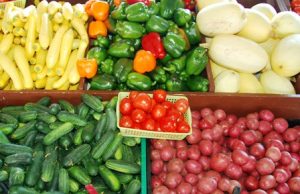This module provides an overview of how and when pesticides are used in the production of ornamental and food-producing plants by organic growers.
 There is a common belief that the organic designation means pesticide-free, but in fact pesticides are often used in organic production. It is important to understand what IS or IS NOT a pesticide and how to properly handle pesticides, so that organic growers can maintain their USDA certification, protect their workers and the environment, and comply with state and federal pesticide laws. Click on any of the sections below (or bullet list on the left) to gain an understanding of the various aspects of pesticide use and safety within an organic production system.
There is a common belief that the organic designation means pesticide-free, but in fact pesticides are often used in organic production. It is important to understand what IS or IS NOT a pesticide and how to properly handle pesticides, so that organic growers can maintain their USDA certification, protect their workers and the environment, and comply with state and federal pesticide laws. Click on any of the sections below (or bullet list on the left) to gain an understanding of the various aspects of pesticide use and safety within an organic production system.
This module was initially compiled by Lenora Jones, Washington State Univ. Urban IPM program
It has been reviewed and edited by:
- Carrie Foss, M.S., Urban IPM Coordinator, Washington State University
- Dean Herzfeld, Ph.D., Pesticide Safety Education Specialist, University of Minnesota.
- Wayne Buhler, Ph.D., Pesticide Safety Education Specialist, NC State University.
- What Organic Means — Learn the legal definition of organic and how it differs from natural
- Terms to Know — Glossary of terms related to organic and conventional agriculture
- Organic Certification — Learn about the National Organic Program, certification, and how to find local certifiers
- When Pesticides can be Used — Describes the pest management methods for organic crop production
- What Pesticides are Allowed — Learn about organic-approved pesticides and the rules governing their use
- Safe Use of Approved Pesticides — Understand the hazards and precautionary measures involved in proper pesticide use
- Recordkeeping and Worker Safety — Follow these procedures to keep the right records and protect your workers
- Disease Management — Description of best practices for plant disease management
- Insect Management — Description of best practices for insect and mite pests
- Weed Management — Description of best practices for weed management
- Resources — Additional reading and resources for organic farming
Initial compilation courtesy of Lenora Jones

